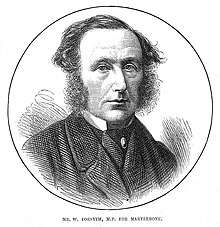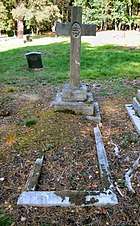William Forsyth (barrister)
William Forsyth QC (25 October 1812 – 26 December 1899) was a Scottish lawyer and Conservative[1] Member of Parliament (MP).

Life
He was born at Greenock in Renfrewshire, son of Thomas Forsyth and Jean Campbell Hamilton. He died at Knightsbridge, Middlesex.
He was educated at Sherborne School and Trinity College, Cambridge,[2] where he graduated B.A. in 1834.[3] He was admitted at the Inner Temple in 1834 and called to the Bar in 1839. He became a Bencher in 1857, Queen's Counsel in 1857 and Treasurer in 1872. He worked on the Midland Circuit. He was Standing Counsel to Secretary of State for India 1859 to 1874. He was elected as MP for Cambridge at the 1865 general election but was unseated in April 1866, being disqualified as holding an office of profit under the Crown.[1] He was later MP for Marylebone from 1874 to 1880.[1]
He wrote a number of books on historical and legal subjects, including History of Trial By Jury (1852), Life of Cicero (1864), The Novels and Novelists of the Eighteenth Century (1871) and Hannibal in Italy (1872). He was also editor of several magazines. Forsyth was a member of the Canterbury Association from 1 May 1848 to 22 April 1850, when he resigned.[4] In 1849, the chief surveyor of the Canterbury Association, Joseph Thomas, named Lake Forsyth for him.[4][5] On his death he was buried in Brookwood Cemetery in Surrey. His will probated at £18,667 in 1899.
Family

Forsyth was married twice. He was firstly married to Mary Lyall (daughter of George Lyall and Margaret Ann Edwards) (1819–1864), in 1843, by whom he had six children (two sons and four daughters). He remarried to Georgina Plummer in 1866; they also had children.[6] His descendants and spouses of descendants include Doreen Knatchbull, Baroness Brabourne, James Stanhope, 7th Earl Stanhope and John Hamilton Wedgwood.
References
- Craig, F. W. S. (1989) [1977]. British parliamentary election results 1832–1885 (2nd ed.). Chichester: Parliamentary Research Services. pp. 15, 77. ISBN 0-900178-26-4.
- "The Sherborne Register 1550-1950" (PDF). Old Shirbirnian Society. Retrieved 16 February 2019.
- "Forsyth, William (FRST829W)". A Cambridge Alumni Database. University of Cambridge.
- Blain, Rev. Michael (2007). The Canterbury Association (1848-1852): A Study of Its Members’ Connections (PDF). Christchurch: Project Canterbury. pp. 32–33. Retrieved 22 March 2013.
- Reed, A. W. (2010). Peter Dowling (ed.). Place Names of New Zealand. Rosedale, North Shore: Raupo. p. 128. ISBN 9780143204107.
- Seccombe, Thomas (1901). . Dictionary of National Biography (1st supplement). London: Smith, Elder & Co.
External links
- Seccombe, Thomas; Baudry, S. R. J. "Forsyth, William (1812–1899)". Oxford Dictionary of National Biography (online ed.). Oxford University Press. doi:10.1093/ref:odnb/9935. (Subscription or UK public library membership required.)
- Works by or about William Forsyth in libraries (WorldCat catalog)
- Hansard 1803–2005: contributions in Parliament by William Forsyth
| Parliament of the United Kingdom | ||
|---|---|---|
| Preceded by Francis Powell Kenneth Macaulay |
Member of Parliament for Cambridge 1865 – 1866 With: Francis Powell |
Succeeded by Francis Powell John Eldon Gorst |
| Preceded by Sir Thomas Chambers Harvey Lewis |
Member of Parliament for Marylebone 1874 – 1880 With: Sir Thomas Chambers |
Succeeded by Sir Thomas Chambers Daniel Grant |